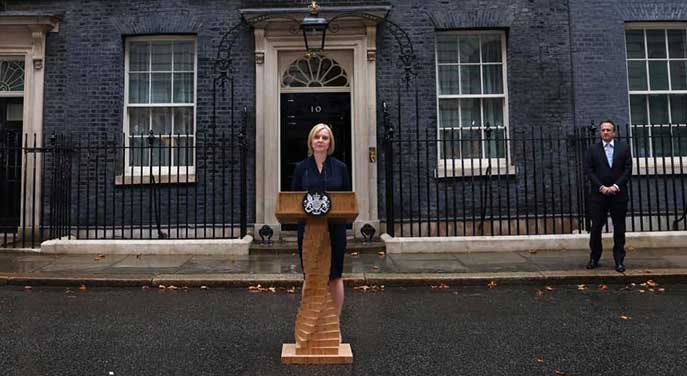 Queen Elizabeth II’s death may have consumed most of the oxygen over the past couple of weeks, but other interesting things are happening. Across the Atlantic, three (non-Ukraine) developments stand out.
Queen Elizabeth II’s death may have consumed most of the oxygen over the past couple of weeks, but other interesting things are happening. Across the Atlantic, three (non-Ukraine) developments stand out.
United Kingdom
U.K. political governance has four great offices of state – prime minister, chancellor of the exchequer, foreign secretary and home secretary. And for the first time ever, none of the four offices is occupied by a white man. Indeed, the only white is the new prime minister, Liz Truss.
Given the U.K.’s demographics, this is astonishing. The ability of minority group members to scale the heights of a polity whose population is over 85 per cent white speaks volumes. It’s a political structure that’s self-evidently permeable.
And the political party facilitating this development isn’t a progressive entity that views everything through identity group lenses. Instead, it’s the right-of-centre Conservatives!
In assembling her cabinet, Truss has looked to political allies. Loyalty and ideological compatibility are the prime prerequisites. Nobody is checking an identity group box.
Take, for instance, the new chancellor Kwasi Kwarteng.
 |
| Related Stories |
| Support for multiculturalism declining in Sweden
|
| Mussolini more a man of the left than of the right
|
| What is the monarchy’s future in Canada? |
Born in London to immigrant parents from Ghana, Kwarteng earned a PhD from Cambridge, worked in the financial sector and was elected to parliament in 2010. He’s also authored several books, one of which – Ghosts of Empire – addressed aspects of Britain’s imperial legacy.
Kwarteng and Truss entered parliament together and subsequently collaborated on a couple of policy-oriented books. These efforts fell into the prescriptive vision category that often attracts young and ambitious politicians. So, if nothing else, the prime minister and her chancellor should be on the same page in the challenging months ahead.
Sweden
For my adult lifetime, Sweden has been famously conformist and self-consciously liberal. It was the place Canadian progressives often pointed to as an aspirational model.
However, things have been getting trickier. Just look at the growing electoral support for the Sweden Democrats.
They entered parliament in 2010 with 5.7 per cent of the vote and have steadily upped their game. As 2022’s results are being finalized, they’re at 20.6 per cent. This makes them Sweden’s second largest party.
They are also a party with unsavoury antecedents. Going back to the 1980s, some of the initial players had neo-Nazi or neo-fascist associations. The modern party has worked at expelling those elements and changing its leadership, but the taint hasn’t entirely gone away.
Consequently, much of the Swedish political and media establishment has combined in an attempt to exclude the Sweden Democrats from the national stage. In effect, they’re the Nordic untouchables, a designation that implicitly extends to their voters. But as the ranks of such voters expand, this becomes increasingly problematic.
The issues propelling the Sweden Democrats are their outspoken opposition to official orthodoxy on immigration and multiculturalism. More recently, the rise in crime has been added to the list.
Between 2002 and 2020, Sweden’s demographic composition changed from 15 per cent foreign background to 26 per cent. For a historically homogeneous and tightly knit society, this is a jolt.
The concept of national family has long been essential to Swedish identity. And this has much in common with the historical reality of tribe, which emphasizes blood relationships, shared history, congruent social values, compatible aspirations and broadly similar experiences. Rapid demographic transformation and assertive multiculturalism can be disorienting and alienating.
With its roots in an agrarian Lutheran society, Sweden has a tradition of social conformity. Swedish political scientist Nicholas Aylott puts it this way: “What is considered legitimate and what is considered illegitimate to say and do are relatively narrow in Sweden, particularly on some questions.”
Hence the establishment impulse to take the concerns raised by the Sweden Democrats off the table. But refusing to address something doesn’t make it go away.
Italy
If the polls are correct, Italy’s September 25 election could put 45-year-old Giorgia Meloni in the prime minister’s office. This would make her the first woman to hold the position.
But if it happens, don’t expect universal celebrations. Meloni, you see, leads the Brothers of Italy, a party that its detractors characterize as far-right or neo-fascist. Although Meloni dismisses the allegation as a smear, it’s true that the party’s 2012 founders – Meloni included – had once been members of a (now extinct) party established by former fascists.
Meloni’s hottest issue is illegal immigration. Some 750,000 migrants have crossed from Libya to Sicily over the past eight years, which makes it a topic with substantial resonance.
Everywhere you look, political orthodoxies are being challenged.
Troy Media columnist Pat Murphy casts a history buff’s eye at the goings-on in our world. Never cynical – well, perhaps a little bit.
For interview requests, click here.
The opinions expressed by our columnists and contributors are theirs alone and do not inherently or expressly reflect the views of our publication.
© Troy Media
Troy Media is an editorial content provider to media outlets and its own hosted community news outlets across Canada.


